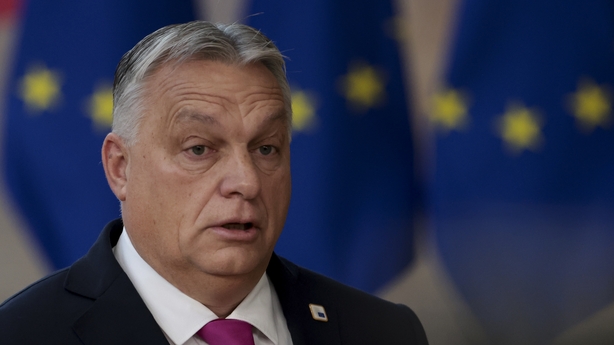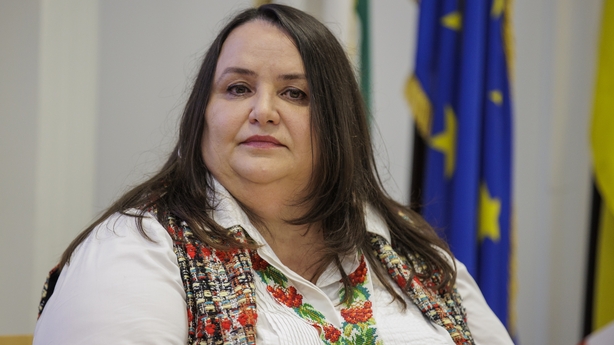Taoiseach Leo Varadkar has said he is disappointed that Hungary blocked some €50 billion in long-term financial support for Ukraine in the early hours of this morning.
"We were here till about two o'clock last night, hoping that we could come to an agreement," Mr Varadkar told reporters on arrival at the second day of the EU summit in Brussels.
"We got to a text that 26 member states could live with, and one that could not.
"So the extra money that we need for Ukraine, but also for other issues like cracking down on illegal immigration, we weren't able to agree on the money for that, unfortunately. So it's going to require another meeting, most likely in the new year. It's disappointing."
He said if no agreement is reached with Hungary in the new year, 26 member states could come together on a bilateral basis to provide Ukraine with the extra funding, outside the EU’s structures.
"That’s not where we want to be, so it’s still possible to come to an agreement as 27 and we’ll try and get to that space in the new year," Mr Varadkar said.
The discussion last night was focused on the EU’s seven year budget, known as the Multi-annual Financial Framework (MFF).
The budget was initially agreed in 2020, but had not accounted for the full cost of the Covid-19 pandemic and Russia’s invasion of Ukraine.
Member states have therefore been negotiating on seeking fresh money, both for Ukraine and for other issues, such as the cost of irregular migration.
Because Hungary vetoed its approval of money for Ukraine last night, the entire discussion on the MFF has had to be shelved until a follow up summit of EU leaders sometime in January.
Ukraine will still receive financial support under existing budgetary commitments, but the EU had hoped to provide a four year package of loans and grants to give Kyiv some stability and reassurance as it continues to resist Russia’s invasion.
Mr Varadkar said: "It isn't just about money for Ukraine, although that's what it's mostly about.
"There's also money for external border security, making it harder for people to enter the European Union illegally. There's also money for the western Balkans and the new neighbourhoods.
"So there are things there that are important as well. And it comes as a package inevitably. So we'll have to work on it over the Christmas break and come back here sometime in January."
He said Ukraine’s accession to the EU would enhance rather than jeopardise Ireland’s and Europe’s security.
"If [Ukraine is] defeated, it won't stop there," Mr Varadkar said.
"There are risks either way, but it's a greater risk, I believe, to leave Ukraine out and leave Ukraine vulnerable to Russia, which as we know from Georgia, we know from Crimea, we know from what they've done elsewhere, that they wouldn't stop with Ukraine."

Accession talks
Hungarian Prime Minister Viktor Orban blocked the €50 billion in EU aid for Ukraine, after leaders side-stepped his opposition to agree to open talks with Kyiv on joining the bloc.
Mr Orban had also opposed starting talks, but agreed to step out of the negotiating room to allow the other EU leaders to take a consensus decision without him.
In a video posted to social media, the veteran leader denounced "a completely senseless, irrational and wrong decision" but complained that "26 other countries have insisted this decision be taken".
The other EU leaders hailed the move which also included agreeing to launch accession talks with Moldova as a crucial moment.
Ukraine's President Volodymyr Zelensky, who did not attend the knife-edge summit, called the decision "a victory that motivates, inspires, and strengthens".
And Moldova's President Maia Sandu said her country had turned "a new page today with the EU's go-ahead for accession talks. Moldova is ready to rise to the challenge".
The agreement to open membership negotiations with Kyiv does not mean that Ukraine will be joining the EU anytime soon.
We need your consent to load this rte-player contentWe use rte-player to manage extra content that can set cookies on your device and collect data about your activity. Please review their details and accept them to load the content.Manage Preferences
Before the talks can be launched, EU states must agree on a negotiating framework - giving Mr Orban ample opportunity to stall the process again.
"This is a bad decision," the nationalist leader said. "We can halt this process later on, and if needed we will pull the brakes, and the ultimate decision will be made by Hungarian parliament."
French President Emmanuel Macron urged Mr Orban to "behave like a European" after the Hungarian leader's veto.
Mr Macron said that EU leaders had heard out Mr Orban with respect but that "this respect implies responsibilities" and thus that Mr Orban "behaves like a European and does not take political progress hostage".
Estonian Prime Minister Kaja Kallas said he is confident in a solution for Ukraine by January, and gave his assurance that the nation would "not be left without support".
Lithuanian President Gitanas Nauseda said that the decision to start accession talks made him "proud to be European" and was cause to celebrate, even if it was "only the first page of a very long, long process".
"The message to Ukraine is: we will be there to support you, we just need to figure out a few of the details together," Belgian Prime Minister Alexander De Croo said.
German Chancellor Olaf Scholz played a key role in getting Mr Orban to leave the room to clear the way for a decision, diplomats and officials said.
Mr De Croo, reflecting frustration with Mr Orban, said it was time for the Hungarian to pipe down.
"If you are part of the decision, you agree with the decision, or afterwards you just have to keep your mouth shut," he said.
Hungary 'defending interests' by blocking aid: Kremlin
Hungary is "defending its interests" by blocking EU aid to Ukraine, Kremlin spokesman Dmitry Peskov said.
"Hungary is a sovereign country. It has its own interests. And Hungary, in contrast to many European countries, firmly defends its interests, which impresses us."
Moscow sees Hungary as one of its only allies inside the European Union.
The Kremlin also said a decision by Brussels to bring Ukraine, Moldova and Georgia closer to EU membership could ultimately destabilise the bloc.
"This is absolutely a politicised decision -- the EU's desire to show support to these countries in this way. But certainly such new members can actually destabilise the EU," Mr Peskov said.
He said Brussels was intent on pitting the former Soviet countries against Moscow.
"Everything is being done to annoy Russia and antagonise these countries towards Russia," he said.

'Historic day for Ukraine and its people'
Ukraine's Ambassador to Ireland Larysa Gerasko has said the people of her country are grateful that the EU has decided to open accession talks describing it as "an historic day".
Speaking on RTÉ's Morning Ireland, Ms Gerasko said: "We deserved this decision but we have to do a lot and I would say the main path is ahead."
She said that financial and military support for Ukraine is "crucial".
"We have to defend the security in Europe and we have to maintain our economy in order to prevent more [of an] emigration crisis in Europe," Ms Gerasko said.
"As far as I know, Hungary will review its position in the beginning of January."
Speaking on RTÉ's Drivetime, Minister of State for European Affairs and Defence Peter Burke said it "could be decade" before the accession of Ukraine to the European Union.
"A range of issues have to be gone through in minute detail before a country can get to that final step," he said.
Mr Burke added that "the accession process does not mean that Ukraine is automatically going to become a member of the EU" as the process for joining the bloc is "a merit-based system".
"There’s 70 different votes that require unanimity among the thirty chapters, each chapter you have to go through to ensure that the country really espouses the values of the EU and it has the rule of law certainty really underwriting it."
On the accommodation issues facing Ukrainians coming to Ireland, Ms Gerasko said that she "understands" the decision of the Government to change the entitlement as she is aware that there is a housing crisis facing many people here.
"I have, of course my concerns as well, because in 90 days it would be very difficult to find accommodation for newcomers, but I prefer to commend the Government's decision," she said.
The changes will likely stop some Ukrainians coming to Ireland and the embassy will make people aware of the difficulties in finding accommodation, Ms Gerasko added.
With additional reporting by AFP







